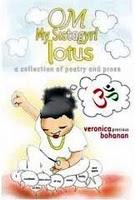Om: My Sistagyrl Lotus

Occasionally a writer surfaces whose poetry is so imbued with authenticity, so intuitively wrought, and so keenly aware of its own integrity that we hardly realize while reading it that we are glimpsing both a protest and a celebration of the world around us. This is the case with Veronica Precious Bohanan’s collection of poetry and prose, Om: My Sistagyrl Lotus. With a voice that sounds at once humble and confident, Bohanan explores her response to life’s attempts to reign in and control the limits of her body and heart. What is truly remarkable about this collection is that it speaks to Bohanan’s own highly personal insights while somehow still sounding familiar to the reader. Bohanan reads the faces around her, hears the sounds of strangers’ conversations, and recreates the tensions of sexual and platonic relationships with such sensory acuity that few seams show between the words on the page and the images they invoke. In particular, her second section, entitled "Passport…," unabashedly illuminates the experience of being a visitor, a foreigner, without the exoticizing, gushing verse that so often renders travel poetry impersonal and trite. Venzuela, for example, inspires the realization, "Izn’t Chavez Black?/Oh, that’z the white Christian threat—/A brotha with oil."
Bohanan embraces the ugly and the beautiful without hesitation, revealing herself to be acutely aware that oppression and freedom are specific to places and times. In addition, Bohanan seems to have a gift for the tempos and rhythms of speech, and this translates—more times than not—into prose and poetry vibrant and thriving with the life behind it. While the book, at times, demands patience as it abruptly switches among poetic styles—from flowing prose to sharp verse—the pieces in the book are written in a vernacular that is neither rigid nor forced (seen as she asks, "wat iz da hip hop poetess role ‘n liberation?"). This command of language adds to the sense that the reader is not so much processing words on a page, but being told a story crucial to the reader’s own experience. Here is where Bohanan truly strikes out on her own: she does not suggest through her poetic recollections of disappointment, sorrow, anger, and joy that her experiences are free for appropriation. Instead, Bohanan’s work fulfills the prophecy of her last poem: "writing self-lyrics . . . I create my destiny."